How to pick the best water treatment system for my home?
Water Science
Why do I need a water softener?
A water softener is a device used to remove minerals, primarily calcium and magnesium ions, from hard water. Here are some reasons why you might consider using a water softener:
- Reduced Scale Buildup: Hard water contains minerals that can accumulate and create scale buildup in pipes, appliances, and fixtures. This scale can lead to reduced water flow, decreased efficiency of appliances like water heaters and dishwashers, and increased maintenance costs.
- Extended Appliance Lifespan: Appliances that use water, such as water heaters, washing machines, and dishwashers, can experience a longer lifespan when used with soft water. Soft water reduces the accumulation of scale, which can lead to more efficient and longer-lasting appliances.
- Better Cleaning: Soft water is more effective at dissolving soap and detergent, leading to better lathering and improved cleaning performance. You’ll likely use less soap and detergent to achieve the same results, which can result in cost savings.
- Softer Fabrics and Skin: Soft water can lead to softer fabrics after laundry and leave your skin feeling smoother after bathing. Hard water can sometimes cause skin dryness and irritation due to its mineral content.
- Efficient Water Heating: Water heaters that use soft water are more efficient because they don’t need to work as hard to heat water through layers of scale. This can result in lower energy bills over time.
- Improved Lathering: Shampoo, soap, and body wash lather more effectively in soft water, leading to a more enjoyable bathing experience.
- Reduced Staining: Hard water can cause mineral stains on faucets, sinks, bathtubs, and glass surfaces. Using soft water can help prevent these unsightly stains.
- Easier Cleaning: Cleaning surfaces like glass, tiles, and bathroom fixtures becomes easier when you’re not dealing with mineral deposits left by hard water.
- Environmental Benefits: Using a water softener can potentially reduce the need for harsh cleaning chemicals and detergents, which can have environmental benefits.
It’s important to note that while water softeners offer several benefits, they might not be necessary for every household. If you’re experiencing issues related to hard water, such as scale buildup or skin irritation, a water softener could be a valuable investment. However, if your water isn’t excessively hard and you’re not facing these issues, a water softener might not be essential. It’s a good idea to have your water tested to determine its hardness before deciding whether to install a water softener.
Which water softener is best for me?
Selecting the best water softener depends on various factors, including your water hardness level, household size, budget, available space, and personal preferences. Here are some steps to help you choose the right water softener for your needs:
- Determine Water Hardness: Have your water tested to determine its hardness level. This will help you understand the severity of the issue and guide your choice of water softener.
- Calculate Water Usage: Estimate your household’s daily water usage to determine the water softening capacity you need. This is usually measured in grains per gallon (GPG) or milligrams per liter (mg/L).
- Choose the Type: There are different types of water softeners, including salt-based ion exchange, salt-free systems, and magnetic or electronic descalers. Each has its advantages and considerations.
- Size of System: Choose a water softener size that suits your household’s water usage. Systems are typically sized in terms of grains of hardness they can remove before regeneration is necessary.
- Consider Efficiency: Look for energy-efficient models that use less water and salt during the regeneration process.
- Installation Space: Consider the available space for installing the water softener. Some systems are compact and can fit in tight spaces, while others require more room.
- Budget: Set a budget for your water softener purchase and installation. Keep in mind that costs can vary based on the type of system, brand, features, and installation requirements.
- Maintenance: Different systems have varying maintenance requirements. Consider how often you’re willing to perform maintenance tasks such as adding salt or replacing filters.
- Read Reviews and Recommendations: Research online reviews and seek recommendations from friends, family, or professionals to learn about the performance and reliability of different water softener brands and models.
- Consult a Professional: If you’re unsure about which water softener is best for you, consider consulting a water treatment professional. They can help you assess your needs and recommend suitable options.
Remember that no single water softener is universally the “best” option for everyone. Your choice should align with your specific needs, preferences, and circumstances. Take your time to research and compare different models, and don’t hesitate to seek expert advice if needed.
Water Softeners, Water Purifiers, Whole-home Water Treatment Solutions
Serving Your Local Area
Contact
Main Office
420 N Business Loop Rd Suite F
Park City, UT 84098

